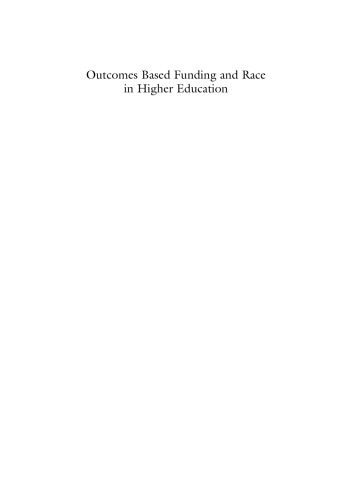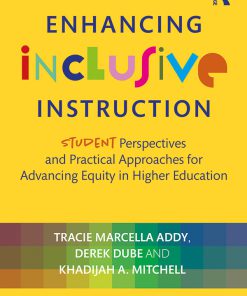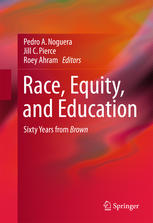Outcomes Based Funding and Race in Higher Education Can Equity be Bought 1st Edition by Tiffany Jones, Sosanya Jones, Kayla Elliott, LaToya Russell Owens, Amanda Assalone, Denisa Gándara 3319494364 9783319494364
$50.00 Original price was: $50.00.$25.00Current price is: $25.00.
Outcomes Based Funding and Race in Higher Education Can Equity be Bought 1st Edition by Tiffany Jones, Sosanya Jones, Kayla C. Elliott, LaToya Russell Owens, Amanda E. Assalone, Denisa Gándara – Ebook PDF Instant Download/DeliveryISBN: 3319494364, 9783319494364
Full download Outcomes Based Funding and Race in Higher Education Can Equity be Bought 1st Edition after payment.

Product details:
ISBN-10 : 3319494364
ISBN-13 : 9783319494364
Author: Tiffany Jones, Sosanya Jones, Kayla C. Elliott, LaToya Russell Owens, Amanda E. Assalone, Denisa Gándara
This book examines how Performance or Outcomes Based Funding (POBF) policies impact racial equity in higher education. Over the last decade, higher education has become entrenched in a movement that holds colleges and universities more accountable to its supporters. There are pressures to answer questions about student outcomes and performance, the value of education, the effectiveness of instructors, and the ability of existing leaders to manage efficiently and effectively. It is within this climate that states have adopted POBF policies. Through POBF, public colleges and universities receive state funding through formulas that no longer rely solely on student enrollment, but are instead based on student outcomes. This book provides an overview for policymakers of how racial equity has been addressed, the impact of these approaches, and recommendations for moving forward.
Outcomes Based Funding and Race in Higher Education Can Equity be Bought 1st Table of contents:
1 Show Me the Outcomes! The Emergence of Performance and Outcomes-Based Funding in Higher Education
How Does POBF Work?
POBF’s Significance and Impact
Book Overview
Theoretical Framing
Methods
Chapter Descriptions
Note
References
PART I Understanding the Impact of POBF on Racial Equity
2 Double or Nothing, States Betting It All on Performance and Outcomes-Based Funding and the Implica
Introduction
Theoretical Framework
Methods
Overview of Ohio Formula
Overview of Central State 2013-1025
POBF Outcomes
Considerations for Central State University
Messaging About Racial Equity
Overview of Tennessee Formula
Overview of Tennessee State University
POBF Outcomes
Considerations for Tennessee State University
Messaging About Racial Equity
Conclusion
HBCUS Have the Most to Gain or Lose
Politics Gets in the Way of Racial Equity
How Much Is Enough to Right Historical Wrongs?
References
3 Reparations and Rewards: Performance and Outcomes-Based Funding and De Jure to De Facto Segregatio
Introduction
Methodology
Legally Enforced Segregation of HBCUs
De Facto and De Jure Segregation
Desegregation Cases That Acted as Legal Interventions to Help Create Equality
Florida’s Brazen Disregard of the Brown Ruling
The Quest for Equity Through the Lengthy Adams Case
Modern-Day Reparations for De Jure Segregation
Twenty-First Century Obstacles to HBCU Advancement, Affirmative Action, and Affordability
Performance-Based Funding Inequities and Implications
The Creation and Implementation of Florida’s POBF System
POBF’s Metrics and Measurements
Conclusion
A Mission-Centered University Bound by a Money-Centered System
References
4 Impacting the Whole Community: Two-Year Minority-Serving Institutions and Performance and Outcomes
Introduction
Theoretical Framework
Review of Literature
Two-Year MSIs and POBF
POBF Research on Community Colleges
Data and Methods
Public Community/Junior College Funding in Texas
Student Success Points Program
Model Design
Discussion and Policy Implications
Conclusion
Notes
References
PART II Examining POBF Design, Adoption, & Revision
5 A Critical Analysis of the Sociopolitical Climate for POBF in Three States
Introduction
Conceptual Framework and Approach
A Profile of Three States
Texas
Demographics
Policymaker Demographics
The Texas Higher Education System and Its Students
Accountability and Reporting in Higher Education
The Adoption of POBF in Texas
California
Demographics
Policymaker Demographics
Higher Education System
Accountability in California
Failed Legislation for POBF in California
Maryland
Demographics
Policymaker Demographics
The Maryland Higher Education System and Its Students
Accountability in Maryland
Proposed POBF Policy in Maryland
Discussion
The Characteristics of Political Leadership
The Scope and Limit of Political Contests
The Nature of Dominant Ideology
The Degrees of Political Struggle or Citizen Participation
The Role of Demographics
Conclusion and Recommendations
References
6 Policy Actors, Advocates, and Critics: The Promotion and Critique of Performance and Outcomes-Base
Introduction
Literature Review
Theoretical Framework
Methods
Findings
A Moving Train
Can You Stop a Moving Train?
Changing Course
Discussion
References
7 Between Words and Action: The Problem with POBF Indictors for Achieving Racial Diversity
Introduction
Literature Review
POBF, Accountability, and Values
State Policymaking and Racial Diversity in Higher Education
Why Racial Diversity Is So Important to Higher Education
Conceptual Framework
Methods
Methodological Approach
Analysis
Explicit Indicators and Weights for Racial Diversity
Proxies and Implicit Language
A Closer Look
Discussion
The Problem with Both Explicit and Implicit Racial Diversity Indicators
Limited Diversity
Addressing the Symptom Instead of the Sickness
Diversity Without Inclusion
Low Priority
Lack of Capacity Building
Conclusion and Recommendations
Note
References
8 Toward a New Framework for Funding for Equity
Introduction
A New Framework
From Institutional “Merit” Aid to “Need-Based” Aid
Equity Is Not Just Inputs and Outputs…It’s Also Experiences
Recommendations for POBF Policy Design and Implementation
Mission Differentiation Should Include MSIs
Align Funding Allocations w/State Equity Goals
People also search for Outcomes Based Funding and Race in Higher Education Can Equity be Bought 1st:
outcomes-based funding for higher education
outcomes based financing
outcomes-based funding education
outcomes in higher education
outcomes based funding
Tags: Outcomes Based, Funding, Race, Higher Education, Tiffany Jones, Sosanya Jones, Kayla Elliott, LaToya Russell Owens, Amanda Assalone, Denisa Gándara
You may also like…
Education Studies & Teaching - History of Education
Uncategorized
Dismantling Race in Higher Education: Racism, Whiteness and Decolonising the Academy Jason Arday
Education Studies & Teaching - School Education & Teaching
Education Studies & Teaching - School Education & Teaching
Education Studies & Teaching - School Education & Teaching
Teaching and Learning for Social Justice and Equity in Higher Education: Foundations Laura Parson
Business & Economics - Industries
University of Nike How Corporate Cash Bought American Higher Education Joshua Hunt
Politics & Philosophy
Business & Economics
Politics & Philosophy - Social Sciences
Uplifting Gender and Sexuality Education Research Tiffany Jones 3030242056 9783030242053












